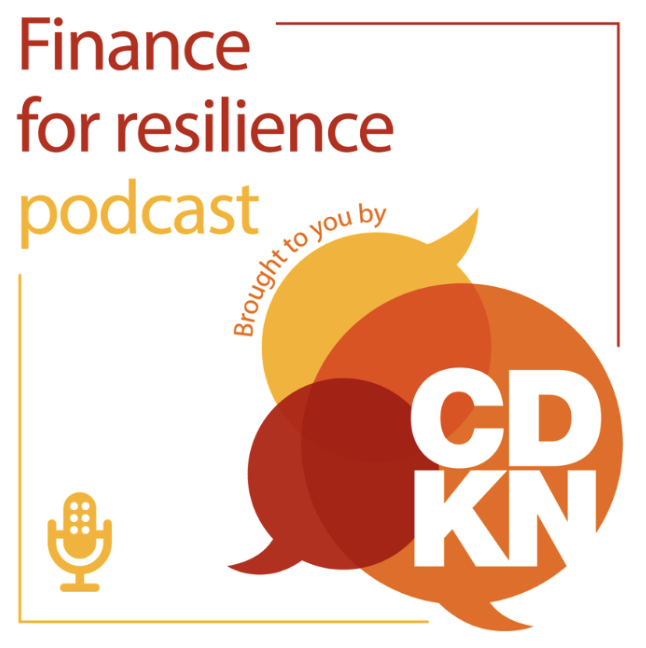CDKN: Finance for Resilience Podcast

Introduction
The Climate and Development Knowledge Network (CDKN) has launched the podcast series ‘Finance for Resilience’, which explores how financial solutions for climate change are developed, and highlights innovative solutions from practitioners and experts. The series is hosted by CDKN’s climate finance lead, Kamleshan Pillay.
Four episodes have so far been released, each of which are 30-40 minutes in length and delve into a particular element of how finance can be used to build climate resilience. You can listen to these episodes below, or on iono.fm.
Episodes
Episode 1: Building climate resilience through microfinance
The first episode unpacks the concept of microfinance, and its role as a financial instrument to build resilience in communities which are vulnerable to climate change. A panel discussion ensues between the host, Kamleshan Pillay, and three guests: Tineyi Mawocha (CEO of Opportunity Bank Uganda), Lydia Baffour Awuah (Senior Programme Manager at Opportunity International), and Puneet Chopra (partner at Microsave Consulting in India).
The discussion covers diverse questions such as:
- How has micro-financing been used in terms of supporting climate initiatives?
- What have been some of the positive impacts of this?
- How can micro-finance enable gender equality in the households of lesser developed countries?
- What safeguards need to be in place against gender-based violence while avoiding reinforcing gender stereotypes?
Episode 2: Demystifying adaptation finance
The second episode aims to demystify ‘adaptation finance’, which is a broad, complex and ever-evolving topic. The host interviews guests Malango Mughogho (Director of ZeniZeni Sustainable Finance, based in South Africa) and Kathryn Bakos (Director of Climate Finance and Science at the Intact Centre on Climate Adaptation at the University of Waterloo in Canada). Listen in as they share some of their insights and experiences from their work, including challenges, solutions, as well as important lessons that are being learned in the process.
Episode 3: The Green Climate Fund: what it is and why it matters in Southern Africa
In the third episode, host Kamleshaan Pillay takes a look at the Green Climate Fund (GCF), the world’s largest fund dedicated to the fight against climate change. Listen to explore why and how the fund started, as well as the real impacts it’s having on the ground. Three guests join the discussion: Karl Mutani Aribeb (Chief Operations Officer at the Environmental Investment Fund of Namibia), Muhammed Sayed (a Climate Change Specialist for the Climate and Environmental Finance Unit at the Development Bank of Southern Africa), and Charlotte Ellis (a project manager on the Southern African Climate Finance Partnership programme). Together they unpack the processes, challenges and successes of working with the Green Climate Fund.
Episode 4: What are green bonds and how to encourage their growth in developing markets
The fourth episode unpacks the topic of green bonds and the challenges and benefits associated with this financing mechanism. Considering the significant climate finance gap, green bonds are likely to play a crucial role in meeting the goals of the Paris Agreement. However, the growth of the market in the global South has lagged in comparison to the rest of the world. This episode hosts an in-depth discussion on green bonds and how to encourage their growth in developing markets. Kamlesh is joined by guests Megan Sager (Director of Sustainable Solutions in Cape Town), Robert Bunyi (Managing Director of Kenya Pooled Water Fund), and Sandeep Bhattacharya (India project manager at the Climate Bonds Initiative).
Related articles
- Estimating Mobilized Private Finance for Adaptation
- Toward climate finance reporting systems in Latin America
- Financing National Adaptation Plan (NAP) Processes: Contributing to the achievement of nationally determined contribution (NDC) adaptation goals
- Climate Finance Knowledge Portal
The resources below are supplied by CDKN and relate to discussion topics within each podcast episode.
Episode 1:Information on Microfinance from the Financial Sector Deepening (FSD) Kenya
Episode 2:Adaptation Briefings: An introduction to financing adaptation to climate change
Episode 3:Status of Pledges and Contributions made to the Green Climate Fund
Episode 4:Climate Bonds Initiative
(0) Comments
There is no content